What Causes Schizophrenia?
 Schizophrenia is a chronic, severe, and disabling psychiatric disorder that affects approximately two million Americans in any given year. Schizophrenia is a psychosis—that is to say, it is a severe mental disorder in which the person’s emotions, thinking, judgment, and grasp of reality are so disturbed that functioning is seriously impaired.
Schizophrenia is a chronic, severe, and disabling psychiatric disorder that affects approximately two million Americans in any given year. Schizophrenia is a psychosis—that is to say, it is a severe mental disorder in which the person’s emotions, thinking, judgment, and grasp of reality are so disturbed that functioning is seriously impaired.
But what causes this condition? The answer to that question has eluded medical science for a long time. “Whether you love someone with the mental illness or have seen it depicted in movies and pop culture, you might find yourself wondering what causes schizophrenia,” wrote Kelly Burch in a recent article on Verywell Health. “Unfortunately, scientists don’t know exactly what causes this mental illness.”
Despite extensive research, the causes of schizophrenia remain unclear. “There is no single organic defect or infectious agent which causes schizophrenia, but a variety of factors increase the illness—among them genetics and obstetric complications,” wrote the late Colorado Recovery founder Richard Warner, MD, in his influential book The Environment of Schizophrenia. In the book, Dr. Warner drew upon the “knowledge of the environmental factors that affect schizophrenia” to suggest “changes which could decrease the rate of occurrence of the illness, improve its course, and enhance the quality of life of sufferers and their relatives.”
“Environmental factors, including some that occur while in the womb, can also contribute to developing schizophrenia,” confirmed Burch in her explainer. “Some research suggests that using drugs, particularly during the teen years, can increase risk for schizophrenia. However, people who are predisposed to schizophrenia may also be at a higher risk of developing substance use disorder. Drug use alone cannot trigger schizophrenia, and drug use during the teenage years cannot be blamed for causing the illness.”
There is however a strong genetic link to developing schizophrenia, which is why the disease often runs in families. According to Burch, about 80 percent of the chance of developing schizophrenia can be explained by genes. “Relatives of people with schizophrenia have a greater risk of developing the illness, the risk being progressively higher among those who are more genetically similar to the person with schizophrenia,” wrote Dr. Warner in The Environment of Schizophrenia.
Research into genetic factors continues. A team of researchers recently developed a new way to study how genes may cause schizophrenia and other neurodevelopmental disorders by growing tiny brain-like structures in the lab and tweaking their DNA.
While new diagnostic tools may play significant roles in the treatment of schizophrenia, meaningful recovery also requires that patients experience a sense of empowerment—a belief in their ability to take charge of their lives and manage the complex demands and consequences of such illnesses.
In any case, genetics seems to be only part of the story. “Since the identical twin of a person with schizophrenia only has a 50 percent risk of developing the illness, we know that genetics alone do not explain why someone gets the illness,” wrote Dr. Warner. “Other powerful factors have to play a part; one of these factors is problems of pregnancy and delivery. The risk for people born with obstetric complications, such as prolonged labor, is double the risk for those born with none.”
“Scientists don’t believe there’s one gene that is responsible for schizophrenia,” reported Burch on the genetic correlation. “Instead, they think there are many genes at play. However, they don’t have a full understanding of what genes impact the risk for schizophrenia.”
Dr. Warner considered schizophrenia primarily a bio-psycho-social disorder significantly affected by the environment surrounding the person with the mental health condition on multiple levels.
Colorado Recovery has been utilizing the Warner method to empower adults with mental illness for many years now. Our program approaches mental healthcare based on a path of self-reliance through developed practiced skills. We recognize the importance of empowerment for recovery, offering transitional living and outpatient levels of care, engaging patients in increasing community participation.
Our treatment facility provides the services needed to address schizophrenia, bipolar disorder, and other serious mental illnesses. Call us at 720-218-4068 to discuss treatment options for you or the person you would like to help.

 When you take a brain tissue sample, all that your analysis generally shows you is an average for all the cell types present. And since there are a whole lot of different cell types in our brain, you get a kind of cell soup, which makes it difficult if not impossible to tell the cells apart, let alone study them.
When you take a brain tissue sample, all that your analysis generally shows you is an average for all the cell types present. And since there are a whole lot of different cell types in our brain, you get a kind of cell soup, which makes it difficult if not impossible to tell the cells apart, let alone study them.
 The suicide risk for people with schizophrenia between the ages of 18 to 34 years is ten times higher than that for the general US population, according to a new study published in May.
The suicide risk for people with schizophrenia between the ages of 18 to 34 years is ten times higher than that for the general US population, according to a new study published in May.
